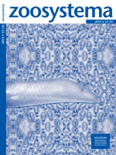
ZOOSYSTEMA
Scope & Guideline
Fostering Innovation in Zoological Research
Introduction
Aims and Scopes
- Taxonomic Descriptions and Revisions:
The journal frequently publishes papers that describe new species or revise existing taxonomic classifications, contributing significantly to our understanding of global biodiversity. - Biodiversity Studies:
Research on biodiversity, particularly in underexplored regions and specific habitats, is a core focus. This includes studies on endemic species and conservation implications. - Phylogenetic Analysis:
Many articles incorporate phylogenetic methods to elucidate evolutionary relationships among species, aiding in the understanding of biodiversity's historical context. - Ecological Implications:
The journal explores the ecological roles and conservation status of various taxa, highlighting the importance of preserving biodiversity in changing environments. - Integrative Taxonomy:
ZOOSYSTEMA promotes integrative approaches that combine morphological, molecular, and ecological data to provide comprehensive taxonomic assessments.
Trending and Emerging
- Molecular Phylogenetics:
There is a growing trend towards the use of molecular techniques, such as DNA barcoding and genomic analysis, to resolve taxonomic questions and understand evolutionary relationships. - Conservation Biology:
Research focusing on the conservation status of species and ecosystems is on the rise, highlighting the journal's commitment to addressing biodiversity loss and informing conservation strategies. - Invasive Species Research:
An increase in studies related to invasive species and their ecological impacts suggests a heightened awareness of global biodiversity threats and the need for management strategies. - Hidden Biodiversity:
Emerging themes include the discovery and documentation of cryptic or previously overlooked species, emphasizing the importance of thorough fieldwork and innovative sampling techniques. - Ecological Interactions and Roles:
There is an increasing focus on understanding the ecological roles of species within their habitats, reflecting a shift towards more holistic approaches to biodiversity research.
Declining or Waning
- Traditional Morphological Taxonomy:
There appears to be a waning focus on purely morphological studies for species description, with more emphasis now placed on integrative approaches that include genetic data. - General Faunal Surveys:
While faunal surveys are still relevant, there has been a noticeable decline in general surveys without specific taxonomic or ecological advancements, as researchers now prioritize targeted studies with clear conservation implications. - Paleontological Studies:
The intersection of paleontology and modern taxonomy has seen reduced attention, possibly as a result of a growing emphasis on contemporary biodiversity and conservation issues.
Similar Journals

ACTA ENTOMOLOGICA MUSEI NATIONALIS PRAGAE
Exploring the Intricacies of Insect LifeACTA ENTOMOLOGICA MUSEI NATIONALIS PRAGAE, published by the esteemed NARODNI MUZEUM - PRIRODOVECKE MUZEUM in the Czech Republic, is an influential journal in the fields of Ecology, Evolution, Behavior and Systematics, as well as Insect Science. With an ISSN of 0374-1036 and an E-ISSN of 1804-6487, this journal has established itself as a vital resource for researchers, professionals, and students interested in the intricate world of entomology. Spanning publications from 2005 to 2024, it is recognized for its contributions to the understanding of insect biology, offering insights on ecological interactions and evolutionary relationships. Although it operates as a subscription-based platform, the journal maintains a respectable presence in scholarly circles, positioned in the Q2 quartile for both relevant categories in 2023. ACTA ENTOMOLOGICA serves not only as a repository of significant empirical findings but also as a discourse platform for emerging entomological concepts, making it an essential read for those involved in the biological sciences.
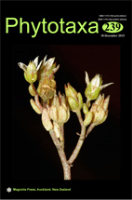
Phytotaxa
Pioneering Discoveries in Plant BiodiversityPhytotaxa, published by MAGNOLIA PRESS, is an esteemed journal in the fields of Plant Science and Ecology, Evolution, Behavior and Systematics. Established to cater to the growing need for high-quality research dissemination in botany, this journal presents the latest findings in plant taxonomy, systematics, and biodiversity. With its H-Index reflecting significant academic influence, and recognized as Q2 in Plant Science and Q3 in Ecology by Scopus, it stands as a reputable source for scholars and practitioners alike. The journal operates without open access restrictions, allowing for a wider reach to its audience. Positioned in New Zealand, Phytotaxa has been pivotal since its inception, contributing to the global understanding of plant diversity and ecology from 2010 to 2024. Its rigorous peer-review process ensures the high quality of published articles, making it an essential resource for researchers, professionals, and students dedicated to advancing the field of botany.
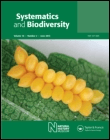
SYSTEMATICS AND BIODIVERSITY
Connecting researchers to the pulse of ecological discoveries.Systematics and Biodiversity, published by Taylor & Francis Ltd, is a prominent academic journal that provides a vital platform for advancing research in the fields of ecology, evolution, and plant science. With an ISSN of 1477-2000 and an E-ISSN of 1478-0933, the journal has established itself as a reputable source of scholarly information since its inception in 2003, and continues to publish cutting-edge studies through 2024. Recognized for its rigorous peer-review process, it holds a prestigious position in academic circles, reflected by its Q2 ranking in Ecology, Evolution, Behavior and Systematics and Q1 ranking in Plant Science as of 2023. The journal's contributions are further characterized by its strong performance in Scopus rankings, placing it in the 69th and 68th percentiles in its respective categories. Researchers, professionals, and students alike will find invaluable insights and innovative methodologies within its pages, making Systematics and Biodiversity an essential resource for those dedicated to understanding the complexities of biological diversity and systematics. The journal's impact factors and commitment to high-quality research underscore its significance in shaping the future of ecological and botanical studies.

Vertebrate Zoology
Unraveling the Mysteries of Vertebrate LifeVertebrate Zoology is a prestigious open-access journal published by the Staatliches Museum Tierkunde Dresden in Germany, focusing on the intricate and diverse field of animal biology. With an ISSN of 1864-5755, the journal has established itself as a vital resource for researchers, professionals, and students in the realms of Animal Science and Ecology, Evolution, Behavior, and Systematics. Since transitioning to open access in 2021, it has expanded accessibility and global dissemination of research findings, showcasing significant studies that contribute to our understanding of vertebrate fauna. The journal's impressive Q1 quartile rankings in both Animal Science and Zoology, as well as Ecology and Evolution, underscore its influence within the academic community—ranking #95 and #220 in their respective categories according to Scopus. Spanning from 2011 to 2024, Vertebrate Zoology aims to provide a comprehensive platform for innovative research, fostering collaboration and advancing knowledge across the biological sciences.
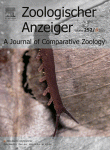
ZOOLOGISCHER ANZEIGER
Elevating Scholarly Discourse in ZoologyZoologischer Anzeiger is a prestigious peer-reviewed journal published by Elsevier GmbH in Germany, dedicated to advancing the fields of Animal Science and Zoology. With its consistent ranking in the Q1 category for both disciplines and a commendable Scopus rank of #165 out of 490, it stands out as a leading platform for innovative research and critical reviews in zoological sciences. The journal has been in continuous publication since 1961, navigating through different converged years, and remains a vital resource for researchers, professionals, and students aiming to deepen their knowledge and contribute to the dynamic field of zoology. Although it does not offer open access, the journal ensures that its content adheres to the highest standards of academic integrity and rigor, making it an essential read for anyone serious about animal biology and ecological studies. For research excellence and impactful scholarly discussions, Zoologischer Anzeiger is indispensable.

Journal of Insect Biodiversity
Diving Deep into Insect Diversity and BehaviorJournal of Insect Biodiversity, published by MAGNOLIA PRESS in New Zealand, offers a vital platform for researchers and professionals interested in the intricate world of insect science. Established in 2019, this journal covers a wide array of topics within its field, focusing on the ecological, evolutionary, and behavioral aspects of insects, while also engaging with paleontological perspectives. With an impressive Q2 and Q3 categorization in multiple ecological disciplines and a growing influence in the Scopus rankings, it serves as an essential resource for scholars aiming to deepen their understanding of insect diversity and its implications for ecosystems. The journal is committed to open access, promoting the dissemination of knowledge without barriers. Researchers, students, and professionals alike will benefit from the timely contributions this journal offers as it continues to reflect the dynamic and evolving nature of insect research up to the year 2024.
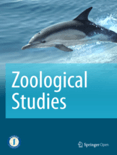
ZOOLOGICAL STUDIES
Illuminating the wonders of the animal kingdom.Zoological Studies, published by the Biodiversity Research Center, Academia Sinica, stands as a pivotal journal in the fields of animal science and zoology. With the ISSN 1021-5506 and E-ISSN 1810-522X, this Taiwanese journal features a blend of pioneering research that spans over three decades, from 1994 to 2024, fostering a deep understanding of biodiversity and zoological phenomena. Recognized for its scholarly contributions, Zoological Studies holds an esteemed Q2 ranking in Animal Science and Zoology for 2023, positioning it among the top-tier journals in its category with a Scopus rank of #164 out of 490—reflecting its strong impact and outreach. While currently not open access, the journal aims to disseminate essential findings and discussions that advance ecological knowledge and inspire future research endeavors. Researchers, professionals, and students alike will find this journal an invaluable resource for accessing critical studies that drive innovation and conservation efforts in the field of zoology.

Zoological Letters
Fostering innovation in animal science and research.Zoological Letters, published by BMC, is a premier open-access journal dedicated to advancing the field of zoology and animal science. Since its inception in 2015, the journal has established itself as a critical platform for researchers to disseminate their findings and contribute to the ongoing discourse in this vibrant discipline. Based in the United Kingdom, Zoological Letters boasts an impressive Q2 category ranking in Animal Science and Zoology for 2023, placing it within the top 25% of journals in the field. With a Scopus rank of #116 out of 490, representing the 76th percentile, it showcases the influence and reach of the research published within its pages. The journal’s substantial focus on contemporary issues and methodologies ensures that it is a vital resource for academics, professionals, and students alike, fostering innovation and collaboration throughout the global scientific community. Open access since 2015, Zoological Letters is committed to making scientific knowledge accessible, thus enhancing the visibility and impact of research in zoological studies.
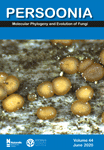
PERSOONIA
Advancing Knowledge in Ecology and Plant SciencePERSOONIA, a distinguished journal published by RIJKSHERBARIUM, serves as a pivotal platform for the dissemination of high-quality research in the fields of Ecology, Evolution, Behavior, and Systematics, as well as Plant Science. Established with a commitment to advancing scientific knowledge, PERSOONIA has achieved an impressive Q1 ranking in these areas, highlighting its significant impact within the academic community, as evidenced by its ranking of #12 out of 721 journals in its field, placing it in the top 2% of publications. With a publication history that spans from 1996 to present, the journal regularly features innovative studies that push the boundaries of understanding in ecological and botanical sciences. While Open Access options are currently limited, researchers and professionals alike benefit from subscription access to this vital resource. Located in the Netherlands, PERSOONIA continues to be a beacon for scholars aiming to enrich the discourse in evolving ecological and plant science disciplines.
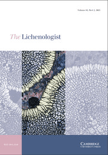
LICHENOLOGIST
Unveiling the Secrets of Lichens: Ecology, Evolution, and BeyondLICHENOLOGIST is a prestigious journal published by Cambridge University Press, dedicated to advancing the field of lichenology and promoting a deeper understanding of the ecology, evolution, and systematics of lichens. Established in 1958 and focusing on the convergence of research through 2024, this journal has established itself as a significant resource within the Q2 category of Ecology, Evolution, Behavior and Systematics. With a Scopus ranking of #316 out of 721 in its field, it highlights research that not only enhances academic knowledge but also has practical implications for ecology and conservation efforts globally. Although traditionally not an open-access journal, it provides valuable insights and contributes to the scientific community by disseminating high-quality, peer-reviewed research. LICHENOLOGIST is essential for researchers, professionals, and students looking to stay informed about the latest advancements in lichen studies, making it an indispensable resource for anyone involved in ecological and biological sciences.